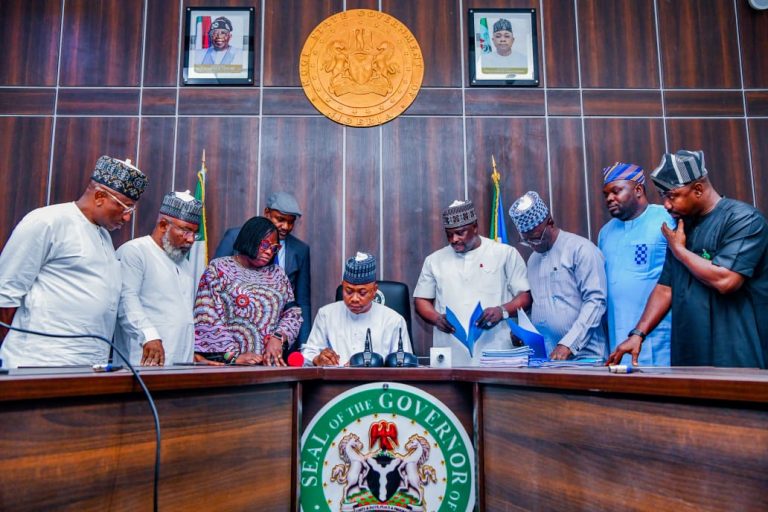By Ezurike Ugochukwu
Kogi State Governor Usman Ododo has signed seven bills into law, reaffirming his commitment to impactful governance and people-oriented development.
The new laws cover various sectors, including oil-producing community development, disaster management, climate change, land administration, electoral reform, and agriculture.
 Speaking shortly after the signing ceremony at the Government House in Lokoja on Friday, the Governor appreciated the Speaker, Aliyu Umar, principal officers and Honourable Members of the State Assembly for what he described as deep sense of responsibility and commitment to good governance, stressing that the bills reflect a shared vision to improve the lives of Kogites and strengthen key pillars of development across the state.
Speaking shortly after the signing ceremony at the Government House in Lokoja on Friday, the Governor appreciated the Speaker, Aliyu Umar, principal officers and Honourable Members of the State Assembly for what he described as deep sense of responsibility and commitment to good governance, stressing that the bills reflect a shared vision to improve the lives of Kogites and strengthen key pillars of development across the state.
The governor restated his administration’s readiness to implement the new laws with urgency, dedication, and fairness.
“These laws are not just mere words on paper; they’re bold steps toward reshaping critical sectors of our development journey, from oil-producing community advancement to electoral reform, land management, environmental protection, and urban regulation.”
 He noted that the amendment to the Kogi State Oil Producing Area Development Commission Law would ensure that oil-bearing communities in the state now benefit from a more transparent, structured, and impactful development framework.
He noted that the amendment to the Kogi State Oil Producing Area Development Commission Law would ensure that oil-bearing communities in the state now benefit from a more transparent, structured, and impactful development framework.
Ododo said that the re-enactment of the Kogi State Emergency Management Agency Law has equipped the state with a more coordinated mechanism for disaster preparedness and response.
He also highlighted the importance of establishing the Kogi State Climate Change Agency, saying it was a clear indication of the government’s commitment to environmental protection, sustainable living, and securing a safer, greener future for generations to come.
The Governor had in a significant move to decongest the state capital and safeguard lives signed into law the restriction of heavy-duty trucks within Lokoja metropolis.
 He described the legislation as “long overdue,” noting that the increasing risks posed by unregulated movement of heavy trucks necessitated immediate and decisive action to restore order, reduce accidents, and improve the flow of traffic in the city.
He described the legislation as “long overdue,” noting that the increasing risks posed by unregulated movement of heavy trucks necessitated immediate and decisive action to restore order, reduce accidents, and improve the flow of traffic in the city.
The Governor also signed the new Kogi State Independent Electoral Commission (KOSIEC) Law, which he said would provide a stronger legal foundation for transparent, credible, and inclusive local government elections, as well as the establishment of the Kogi State Bureau of Lands.
 According to him, the agency would modernize land administration, eliminate unnecessary bottlenecks in land acquisition and documentation, and boost investor confidence in the state’s property sector.
According to him, the agency would modernize land administration, eliminate unnecessary bottlenecks in land acquisition and documentation, and boost investor confidence in the state’s property sector.
He stressed the importance of agriculture to Kogi’s economy, stating that the amendment of the Commodity Exchange and Export Promotion Law was aimed at empowering farmers, strengthening the agricultural value chain, and positioning Kogi as a major player in national and international agro markets.
He cited his recent visit to Lagos, where he signed a landmark partnership deal targeted at transforming the lives of farmers and scaling Kogi’s agricultural output.
He urged the people to take the newly signed laws seriously, warning that anyone who violates the law, regardless of status, would be held accountable, underscoring his administration’s zero-tolerance policy on impunity.
“I remain committed to delivering a Kogi State that works for all, where governance is not about promises but about action; not about words, but about impact.”
 Rt Hon. Aliyu Umar, the Speaker of the Kogi State House of Assembly, lauded the Governor for his development strides in the state, assuring him of the cooperation of the House of Assembly. He urged the Governor to throw all his political will behind the smooth implementation of the laws.
Rt Hon. Aliyu Umar, the Speaker of the Kogi State House of Assembly, lauded the Governor for his development strides in the state, assuring him of the cooperation of the House of Assembly. He urged the Governor to throw all his political will behind the smooth implementation of the laws.
He praised the governor for sponsoring what he termed, “People -oriented” laws, saying some of the bills have taken care of some agencies that have been operating in the state for more than 30 years without legal backing.
He however urged the state governor to help digitise the House of Assembly Complex, in order to enhance their administrative efficiency.
He also stated that two other bills will soon be passed to the executive for the governor’s assent.

 Business5 years ago
Business5 years ago
 News6 years ago
News6 years ago
 Crime2 years ago
Crime2 years ago
 News1 year ago
News1 year ago
 News5 years ago
News5 years ago
 Football6 years ago
Football6 years ago

 Speaking shortly after the signing ceremony at the Government House in Lokoja on Friday, the Governor appreciated the Speaker, Aliyu Umar, principal officers and Honourable Members of the State Assembly for what he described as deep sense of responsibility and commitment to good governance, stressing that the bills reflect a shared vision to improve the lives of Kogites and strengthen key pillars of development across the state.
Speaking shortly after the signing ceremony at the Government House in Lokoja on Friday, the Governor appreciated the Speaker, Aliyu Umar, principal officers and Honourable Members of the State Assembly for what he described as deep sense of responsibility and commitment to good governance, stressing that the bills reflect a shared vision to improve the lives of Kogites and strengthen key pillars of development across the state.
 He noted that the amendment to the Kogi State Oil Producing Area Development Commission Law would ensure that oil-bearing communities in the state now benefit from a more transparent, structured, and impactful development framework.
He noted that the amendment to the Kogi State Oil Producing Area Development Commission Law would ensure that oil-bearing communities in the state now benefit from a more transparent, structured, and impactful development framework. He described the legislation as “long overdue,” noting that the increasing risks posed by unregulated movement of heavy trucks necessitated immediate and decisive action to restore order, reduce accidents, and improve the flow of traffic in the city.
He described the legislation as “long overdue,” noting that the increasing risks posed by unregulated movement of heavy trucks necessitated immediate and decisive action to restore order, reduce accidents, and improve the flow of traffic in the city. According to him, the agency would modernize land administration, eliminate unnecessary bottlenecks in land acquisition and documentation, and boost investor confidence in the state’s property sector.
According to him, the agency would modernize land administration, eliminate unnecessary bottlenecks in land acquisition and documentation, and boost investor confidence in the state’s property sector. Rt Hon. Aliyu Umar, the Speaker of the Kogi State House of Assembly, lauded the Governor for his development strides in the state, assuring him of the cooperation of the House of Assembly. He urged the Governor to throw all his political will behind the smooth implementation of the laws.
Rt Hon. Aliyu Umar, the Speaker of the Kogi State House of Assembly, lauded the Governor for his development strides in the state, assuring him of the cooperation of the House of Assembly. He urged the Governor to throw all his political will behind the smooth implementation of the laws.













